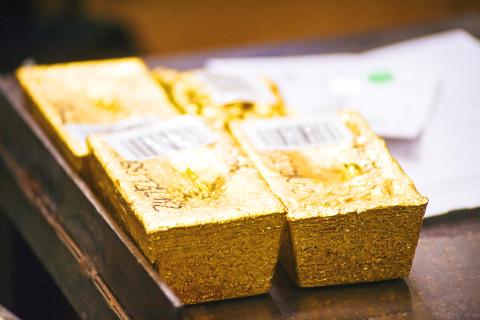Hedge funds are pulling out of gold bets, as more exciting moves in equities and cryptocurrencies make safe-haven investments look boring.
Money managers cut their bets on a bullion rally at the fastest pace in five months as prices head for their worst quarterly loss in a year.
Speculators are throwing in the towel as the precious metal failed to sustain the gains that took futures to a one-year high in September.

Photo: Bloomberg
While the metal posted some modest gains recently, its performance still pales in comparison to the record-breaking rally of US equity indices and the dizzying surge in bitcoin.
Synchronized global growth and prospects for higher US interest rates hurt the appeal of non-interest bearing gold, while geopolitical tensions failed to spur enough haven demand.
“Nobody cares about gold right now,” said Joe Foster, who manages the US$670 million VanEck International Investors Gold Fund from New York. “With the stock market marking new highs, everybody’s talking about bitcoin, nobody needs a safe-haven asset in this environment, but I think it would be foolish not to have an allocation to gold, because it has a very low correlation to stocks and it’s a hedge against systemic financial risk.”
In the week that ended on Tuesday, money managers reduced their net long positions, or the difference between bets on a price increase and wagers on a decline, by 43 percent to 80,453 futures and options, according to US Commodity Futures Trading Commission data released three days later.
That is the lowest since July 25.
Open interest, the tally of outstanding futures contracts on the Comex, fell on Thursday. The drop came even after the US Federal Reserve stuck to its projection for three interest-rate increases next year, easing concerns that policymakers would be more aggressive.
Investors are retreating as the 60-day historical volatility of gold futures languishes near the lowest since 2001, limiting opportunities to make money from actively trading the metal.
Even bullion’s loyal customers are shying away.
In India, the second-largest market for the metal, imports were said to have slumped for a third month last month as demand slowed.
In China, the top buyer, the central bank has not added to its gold reserves since October last year, data compiled by Bloomberg show.
In the US, monthly coin sales last month slumped 23 percent from a month earlier and since April have been hovering near the lowest since 2015.
The precious metal has been under pressure from rising US interest rates and improving odds that US President Donald Trump’s plan to cut corporate taxes will finally get approval from the US Congress.
Spot gold on Friday rose 0.3 percent to US$1,256.74 an ounce, up 0.7 percent from last week’s US$1,247.58 an ounce.
“It’s hard to get excited about gold, or any other asset if every time you jump into it, expecting it to respond in a certain way and it doesn’t,” said Cameron Brandt, director of research at EPFR Global, which tracks the fund flows in mutual funds. “If an asset class is not responding to your logic, why risk your career on it.”
Other metals:
Copper on Friday gained 2 percent to US$3.11 a pound.

Intel Corp chief executive officer Lip-Bu Tan (陳立武) is expected to meet with Taiwanese suppliers next month in conjunction with the opening of the Computex Taipei trade show, supply chain sources said on Monday. The visit, the first for Tan to Taiwan since assuming his new post last month, would be aimed at enhancing Intel’s ties with suppliers in Taiwan as he attempts to help turn around the struggling US chipmaker, the sources said. Tan is to hold a banquet to celebrate Intel’s 40-year presence in Taiwan before Computex opens on May 20 and invite dozens of Taiwanese suppliers to exchange views

Application-specific integrated circuit designer Faraday Technology Corp (智原) yesterday said that although revenue this quarter would decline 30 percent from last quarter, it retained its full-year forecast of revenue growth of 100 percent. The company attributed the quarterly drop to a slowdown in customers’ production of chips using Faraday’s advanced packaging technology. The company is still confident about its revenue growth this year, given its strong “design-win” — or the projects it won to help customers design their chips, Faraday president Steve Wang (王國雍) told an online earnings conference. “The design-win this year is better than we expected. We believe we will win

Chizuko Kimura has become the first female sushi chef in the world to win a Michelin star, fulfilling a promise she made to her dying husband to continue his legacy. The 54-year-old Japanese chef regained the Michelin star her late husband, Shunei Kimura, won three years ago for their Sushi Shunei restaurant in Paris. For Shunei Kimura, the star was a dream come true. However, the joy was short-lived. He died from cancer just three months later in June 2022. He was 65. The following year, the restaurant in the heart of Montmartre lost its star rating. Chizuko Kimura insisted that the new star is still down

While China’s leaders use their economic and political might to fight US President Donald Trump’s trade war “to the end,” its army of social media soldiers are embarking on a more humorous campaign online. Trump’s tariff blitz has seen Washington and Beijing impose eye-watering duties on imports from the other, fanning a standoff between the economic superpowers that has sparked global recession fears and sent markets into a tailspin. Trump says his policy is a response to years of being “ripped off” by other countries and aims to bring manufacturing to the US, forcing companies to employ US workers. However, China’s online warriors